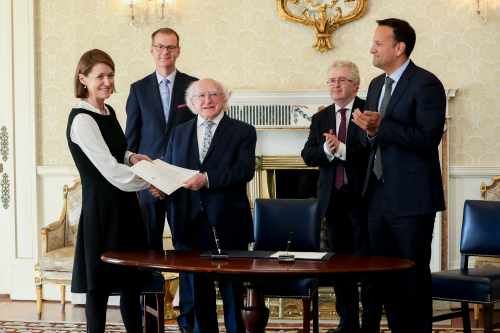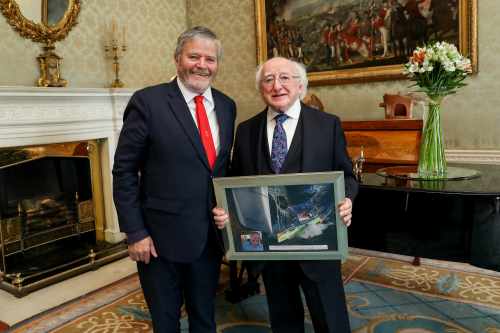Speech at Young Philosophers’ Awards
University College Dublin, Wednesday, 15th May, 2019
Tugann sé an-áthas dom a bheith anseo inniu ag an dara Féile Duais na bhFealsúna Óga. Ba mhaith liom buíochas a gabháil leis an tOllamh Deeks as an cuireadh caoin a bheith libh, agus go raibh maith agaibh go léir as an fáilte cineálta.
[It is a great pleasure to be here this afternoon for the second Irish Young Philosophers’ Award Festival. I would like to thank Professor Deeks for his kind invitation to join you, and all of you for that very generous welcome.]
May I commence by saying how greatly impressed I am by the wide range of subjects covered by almost four hundred projects on display here from Primary and Secondary Schools across Ireland. It is a cause for celebration surely that the number of entries has doubled since last year.
That is the best endorsement that these Awards could have got and is such encouraging evidence the we have, in this country, a rich well of imaginative and questioning young people, willing to explore, reflect, think beyond the familiar and in doing so get enjoyment from it. What a great way to become engaged and participative citizens.
It is greatly uplifting to know that not only are the seeds of philosophical thinking and reflection, principles and various methods are being sown in primary school where our young people begin their formal education, but that a greatly visible growth period is now taking place in junior cycle where philosophy has been introduced as a curricular subject for the junior cycle profile of achievement. It is always important to always bear in mind that no answer can ever fully exhaust a good question, that is what makes philosophy an emancipatory practice.
Eighteen months ago, I had the privilege of hosting the launch of these important awards in Áras an Uachtaráin. It was a greatly significant event, recognizing how the teaching of philosophy could be such a powerful tool in enabling our young people to grow and develop into citizens with the facility to think critically, to question, debate, consider topics creatively and with an open mind, be enabled to ask the difficult and challenging questions that will change the tenor of a discussion while also valuing the capacity to listen to alternative opinions.
It was, indeed, a moment of hope, of anticipation, and it is inspiring to be here today and meet with so many young people who have been willing to travel that pathway into a deeper ethical consciousness, helping to bring to fruition the aspiration that motivated these awards – a fundamental change in how we view the role and aims of education within our society and an acceptance of how the teaching of philosophy can provide such a strong framework on which to build the teaching of other subjects. The neglect of philosophy can have such far reaching consequences, putting limits, even diminishing the learning of so many subjects, thus depriving our young people of so much of the enrichment of learning, of what Edward Sadr called the riches that lie in the interstices between subjects.
Indeed, a greatly important aspect of the junior cycle philosophy course is the emphasis placed on philosophy within a range of contexts. We may be familiar with philosophy in terms of knowledge, of moral philosophy, of ethics. But philosophy is broader than that. I am delighted to know that the Junior cycle students taking philosophy now learn about the philosophy of language, the philosophy of education, the philosophy of art, the philosophy of sport, the philosophy of science and technology, the philosophy of religion, a range of thinking that is reflected in the imaginative and thought-provoking projects on display here today. Everything has a context, yet what is original can still come to be, born not only out of experience but of the world of the imagination.
In this modern and globally connected world, talk of a knowledge society and the need to enable our young people to meet its needs has come to dominate our view as to the ultimate aim of a secondary school education. We need to be careful. A knowledge society must include knowledge of how to live alone and together in a vulnerable planet and do so with a joy that can be shared. Too many have, often unknowingly, accepted a narrow and utilitarian view of such an education – that we exist to be made useful – which leads to a great loss of the capacity to critically evaluate, question and challenge.
In the process too often, we have come to reduce the aim of a young person’s education to the pursuit of points and grades, the choosing of subjects for practical and functional purposes, the ability to learn off by heart and regurgitate, the studying of patterns and likely questions, the preparation of required answers, the ability to imitate rather than create.
There has been a very real danger that the powerful and vital force of creative thinking in the creation of truly functioning societies will come to be forgotten, overlooked, a lost art as we pursue solely the skills and outcomes that will prepare our young people for the world of paid work.
Yet history tells us that it is the asking of questions to which there is, yet, no definitive answer that leads to new discoveries, new possibilities, the potential to create a better world are no longer scarred by global poverty, deep and growing inequalities, exclusions and vulnerabilities exploited by hate. and to meet the great challenges of our time.
If we are to facilitate our young people becoming such citizens, citizens who can develop ideas and concepts that can bring about real transformation and build more inclusive societies we must bring a wider understanding to our view of education, comprehend it as being about so much more than the provision of a limited set of competencies. For example, econometrics is a useful tool, but it is not political economy. What it is that you measure surely is as important as your measuring tool.
We must learn to reflect what it means, requires to live in a democratic space where everyone’s voice is valid and where fallibility, listening, reconsidering and changing one’s mind is appreciated as a fundamental part of philosophical enquiry, and to ensure our educational institutions are places where students are respected and facilitated to grow in awareness of self and others, and share with respect and joy their capacities, their shared joy.
The launch of the Irish Young Philosopher Awards, aimed at encouraging our primary and secondary school pupils to think creatively and humanely around the critical issues and challenges that face our society today was, therefore, a greatly welcome development and one to which so many of our young people and educators have responded positively and with great vision. I so thank them and congratulate them. The range of topics covered, and questions asked is quite astounding and greatly impressive.
They encompass pressing issues of our times including our responsibility to live more ethically on our shared planet, how companies can operate within morally justifiable environments, the dangers of fake news, how we can reap the benefits of artificial intelligence within boundaries that are principled and humane; they explore the ways in which concepts such as forgiveness, friendship and happiness can enrich our lives and our societies; they reflect on changing moralities and values, the meaning and purpose of our existence, our understanding of right and wrong; they ask ‘what is utopia’? ‘what is religion’? ‘what is love’? ‘what is art’? They, in so many ways, affirm that the students here today have worked extremely hard on developing the skills needed for philosophical dialogue: careful listening, critical thinking, careful analysis, logic, argumentation, collaborative problem-solving, and reflection.
May I also say, reinforcing my statement that the good question is never exhausted that in no way does any of what I have described as the pursuit of ethical living challenge transiently thought of belief. They enhance each other as mind and spirit work.
I would like to thank all of the young people who have brought together the remarkable array of projects on display today. You have all demonstrated that you have greatly inquisitive minds and a great capacity to get to the root of human problems, whether of an existential, metaphysical, or of a moral-ethical kind. You, as the future of this country, have provided ample evidence here today that you will be citizens of whom we can be truly proud.
In congratulating the young people here today, I would also like to thank and congratulate, in a special way, Dr Danielle Petheridge of the School of Philosophy and Dr Aine Mahon of the School of Education both here in UCD, who founded the Irish Young Philosopher Awards. It is an initiative that will enable future generations and communities, schools of philosophers to emerge enhancing their thinking and reflective processes and exploring and promoting dialogue about life beyond the everyday.
Mar fhocail scoir, ba mhaith liom a athrá, gur ba mhór an pléisiúr a bhí ann inniu teacht anseo agus casadh leis an ngrúpa seo daoine óga spreagúil. Comhairdeachas libh go léir agus guíonn mé gach rath oraibh sa todhchaí.
In conclusion may I say, once again, what a pleasure it has been to come here today and meet with such an inspiring group of young people. I congratulate you all and wish you every success in the future.


